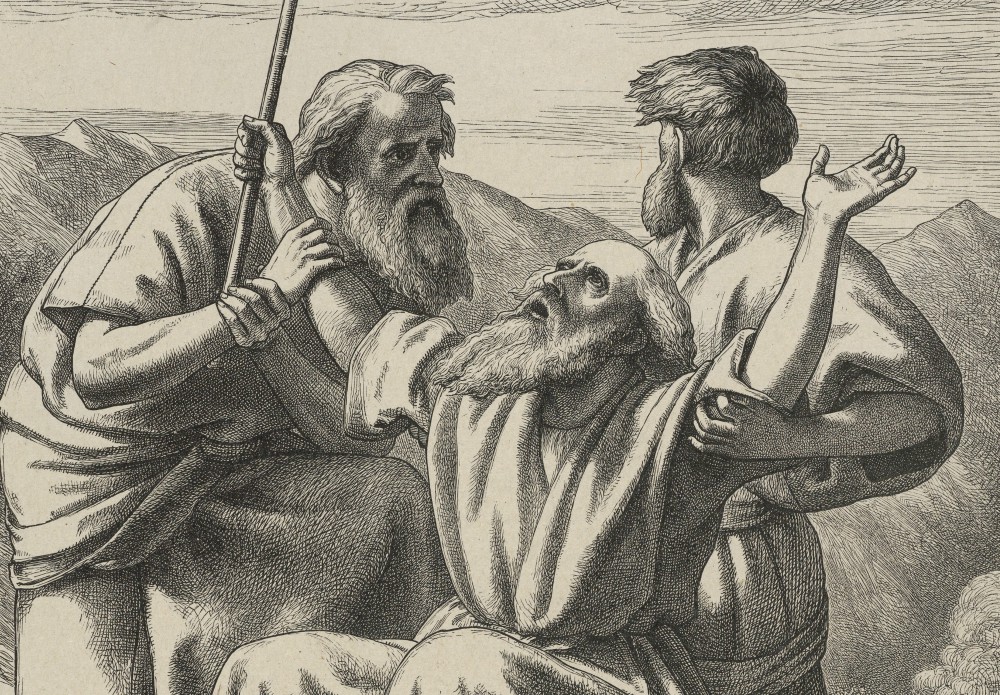
"Moses' Hands Held Up," detail of a 19th-century wood engraving by Frederick Richard Pickersgill (Wikimedia Commons/Metropolitan Museum of Art)
Does prayer really work? How? Those are questions this Sunday's readings invite us to ponder.
Our reading from Exodus is intriguing. The Israelites were being attacked by the Amalekites, so Moses tells Joshua to pick out some good fighters and send them into battle. For his part, Moses will be watching over them, holding up his powerful staff. As long as Moses kept his arms raised, Israel stayed ahead, but if he took a rest, the enemy began to win the battle.
This sounds like the same kind of efficacy attributed to surefire novenas or burying a statue of St. Joseph: "If I do this, God (or St. Joseph) must do that." That's either magical thinking or barter, a transaction that substitutes an interpersonal relationship with payment.
At first glance, the theology of prayer doesn't seem to get much better with today's Gospel. Jesus' story about the widow and the self-centered judge appears to teach that if your first request isn't answered, you should badger heaven relentlessly until God surrenders — in other words, persist until your self-interest overcomes God's apathy.
These interpretations seem pretty far from Jesus' way of praying and his talk about the Father. How can we square them with the teacher who told us not to drone on like the pagans, and whose every address to his father spiraled around the refrain, "Not my will, but thine be done"?
We need alternative approaches if these readings are to lead us beyond magic and a consumerist approach to prayer.
Paul's advice to Timothy gives us a good starting point. Paul tells his young protégé, "Remain faithful to what you have learned and believe because you know from whom you learned it." Paul reminds Timothy that prayerful meditation on the Scriptures leads to wisdom for salvation and equips us for every good work.
We might take Paul's words as an invitation to recall the history of our life of prayer — our interactive relationship with God.
Advertisement
Who taught you to pray? How did they explain the purpose of prayer? How has your image of God changed as you have grown? How has your way of praying changed as you have matured? How would you compare your prayer to your interactions with the people who are closest to you?
Today, we pray Psalm 121. It draws an image of God as our guardian whose arrival we long for and who protects our footsteps. Perhaps we should let that image reinterpret today's story about Moses. (Before we start, we need to hear in its historical context this story about which army would slaughter the other. In the mindset of Exodus, the Lord was Israel's tribal god and demonstrated his superiority in their ability to overpower their enemies.)
Leaving the carnage aside, rather than think that Moses' raised arms forced God to give Israel the advantage, we might understand Moses as a representation of God's ever-loving, watchful care. Moses did not do the fighting for Israel, he simply watched over them, keeping them aware of his attention to them. When he tired out, his disciples made sure that the people didn't lose sight of his ongoing presence. This would change the message from a story of magic to one of moral support.
Now to the example of the widow and the narcissistic judge. Suppose that we look at the woman as a disciple who is not only deprived of her rights, but who chooses to act out of evangelical love. She approaches this judge who, worse than an enemy, has chosen to remain indifferent to others and their needs.
The widow's persistence, her unstoppable attempts to wake him up to what he ought to do, are a way of preaching conversion. She is demanding the sort of relationships that characterize the reign of God. Of course, a just solution will be to her benefit. It will also be to the benefit of the whole world, including the judge and whoever it was who took advantage of the poor widow.
In the end, what do these readings tell us about prayer?
Paul reminds us that we grow in prayer in the same way that we mature in relationships. Moving beyond childish magic or attempted coercion, we are invited to look at prayer, be it private or communal, as the deepest expression of our ever-growing relationship with God. Both the image of Moses keeping vigil over his people and Psalm 121 remind us that God seeks us first and wants only good for us.
The tale about the widow is a reminder the Christian vocation necessarily includes the call to disturb the false peace of the complacent.
Prayer really works. It grounds us in the grace we need to move unjust judges and is the impetus for every other good work.
[Mary M. McGlone is a Sister of St. Joseph currently writing the history of the Sisters of St. Joseph in the U.S.]
Editor's note: Sign up to receive weekly Scripture for Life emails.







